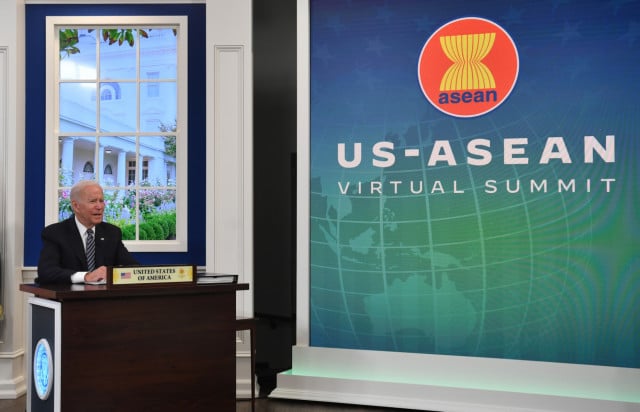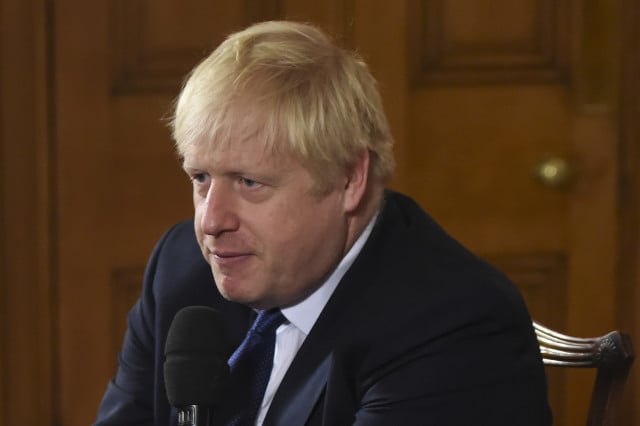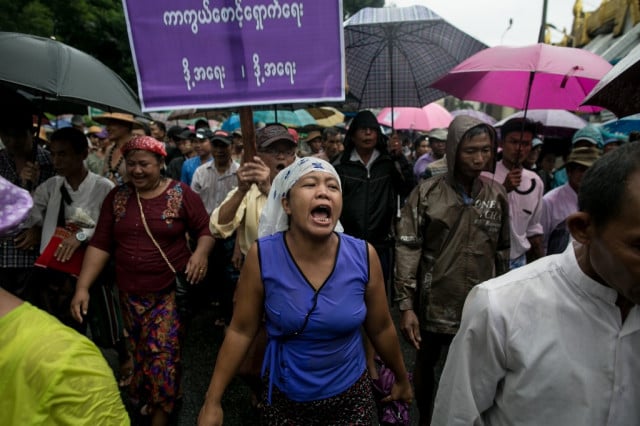Analysts: ASEAN Needs the US for Security and Economy

- By Lay Sopheavotey
- and Teng Yalirozy
- April 20, 2022 8:45 AM
First ASEAN-US special summit in five years will take place in Washington D.C. in May
PHNOM PENH – Association of Southeast Asian Nations (ASEAN) needs the United States in terms of security and economy, say analysts who see the positive effects of the upcoming ASEAN-US special summit on May 12-13.
The two-day meeting between ASEAN leaders and US President Joe Biden in Washington D.C. will boost mutual trust in maintaining peace, stability, and prosperity in the region, especially cooperation and mutual benefit, says the press release issued on April 16.
The meeting will enhance cooperation in areas such as the COVID-19 response, global health security, climate change, sustainable development, maritime cooperation, human resources, and economic relations. In addition, ASEAN and US leaders will exchange views on regional issues of common interest and concern, the statement reads.
ASEAN-US summits have been missed since 2017, under the Donald Trump Administration, said Vann Bunna, co-founder of the analysis forum The Thinker Cambodia and a research fellow at the Cambodian Institute for Cooperation and Peace (CICP). It will also be the first in-person engagement between leaders in the past five years, specifies the statement.
But with the election of President Joe Biden, the resumption of the ASEAN-US summit proves that ASEAN still matters on the world stage and that the United States wants to increase its influence in the region to compete with China, he said.
The meeting to be held next month will highlight ASEAN's diplomacy to the international community, especially its involvement with the superpower, pursuing a policy of neutrality, Bunna added.
“ASEAN really needs the United States, both in terms of security and economy,” he said. “Therefore, ASEAN leaders may speak frankly with Joe Biden on security issues, especially trade shifts to restore the regional economy that ASEAN wants.”
Bunna added that the United States also sees ASEAN as an important foreign policy target, so it aims to strengthen closer cooperation with the 10-country association.
Ro Vannak, a foreign policy expert and co-founder of the Cambodian Institute for Democracy, said that ASEAN will have a good diplomatic influence in the international arena through this meeting. Cambodia, the current chair of ASEAN, is also very likely to discuss the Myanmar crisis at the summit with the United States, he said.
However, Vannak also sees negative effects on the geopolitical rivalry between China and the United States in the Indo-Pacific region, with ASEAN being at its center.
“The summit underscores the importance of US-ASEAN relations, and the negative consequences will be that ASEAN could be torn apart, with some members being supported by the US while others are supported by China,” said Vannak. “I see the situation getting tense.”
The rivalry between the superpowers is not just about geography, politics, and influence, it is an American-backed democratic ideology challenging a Chinese-backed dictatorship ideology, he added.
Taking advantage of bilateral talks to bring GSP issues on the table
Cambodian leaders may seize the opportunity to meet bilaterally with US President Joe Biden outside the ASEAN framework to discuss past differences, said Vann Bunna, from The Thinker Cambodia.
In case a bilateral meeting happens, Cambodia is likely to raise many political, human rights, and economic issues, especially requesting the renewal of its eligibility to the Generalized System of Preferences (GSP) from the United States, he said.
GSP is a type of preferential tax scheme that allows the import of goods duty-free. Cambodia had received GSP from the United States since 1997, mostly on travel goods –luggage, backpacks, handbags, and wallets, all being largely produced in the Kingdom– but its eligibility for the system expired on Dec. 31, 2020. GSP renewal is conditioned on a range of criteria, including labor standards, human rights and the rule of law.
“If there is a bilateral meeting, there may be a discussion on the GSP agreement on what the United States wants from Cambodia to be able to benefit from the GSP. And what does the Cambodian government need to do next to get the GSP?” said Bunna.
Ro Vannak shares Bunna’s analysis, adding that an agreement on GSP could sustain the ongoing economic recovery after the COVID-19 crisis. In 2020, Cambodian exports to the US totaled $6.6 billion, up 23 percent from 2019, and represented 38.4 percent of Cambodia’s total exports.
“The United States is a big economic partner that Cambodia is trying to persuade. As we know, Cambodia has hired an American advocate to speak good for Cambodia to the United States Government,” he said.
Vannak noted that Cambodia still considers the United States as an important market, especially with preferential tariffs. Therefore, Cambodia will raise the GSP case if there is any bilateral meeting.
Vann Bunna, from The Thinker Cambodia, stressed that above all, Cambodia wants to restore Cambodia-US relations through a meeting with Joe Biden. The Cambodian leader will show its willingness to restore the political situation and speak frankly or explain various issues on which the two sides disagree.
However, Phil Robertson, deputy director of Human Rights Watch's Asia Division, stated that the meeting between ASEAN nations and the White House has a lot of ambiguity.
He raised the issues of extrajudicial executions (EJEs) in the Philippines, 100 prisoners in Cambodia and Vietnam, and the rights-violating NGO law in Thailand.
“Many missing pieces!” he wrote on Twitter.
The US previously wished to hold the meeting on March 28-29. However, many ASEAN leaders asked for it to be held on March 26-27. Therefore, the summit had been postponed due to scheduling difficulties, which sparked concerns for the ASEAN-US links.















